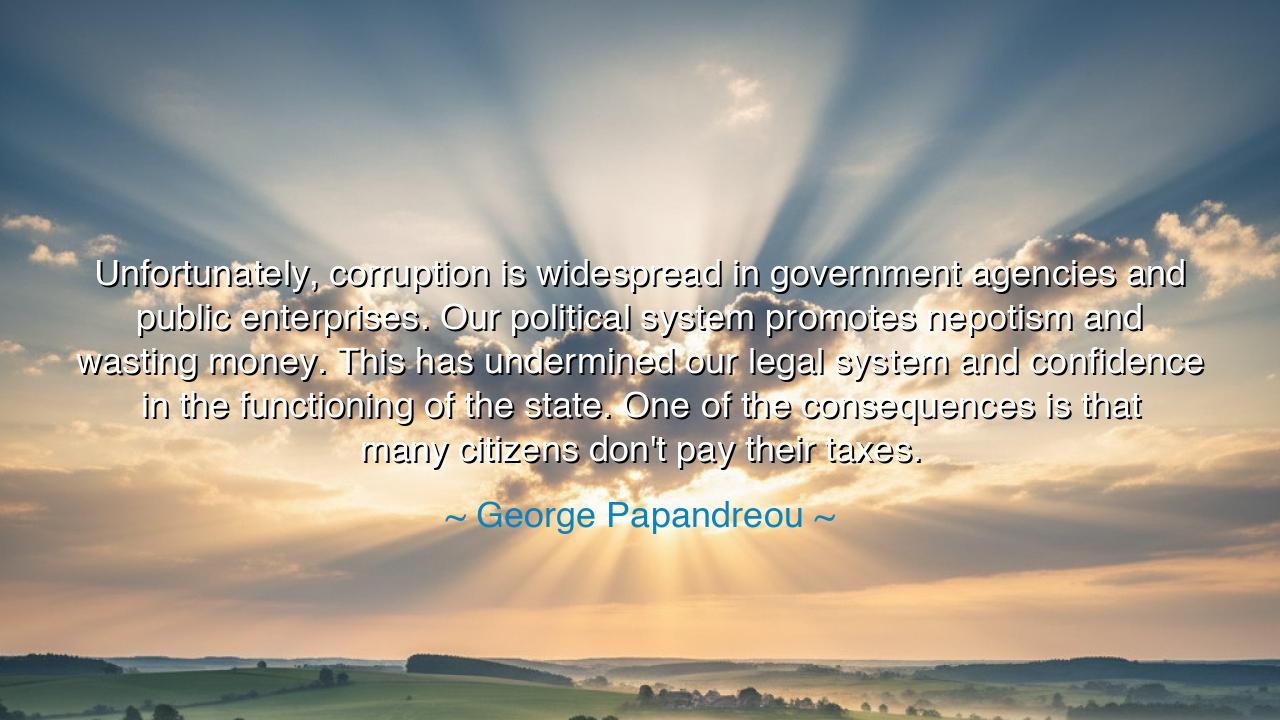
Unfortunately, corruption is widespread in government agencies
Unfortunately, corruption is widespread in government agencies and public enterprises. Our political system promotes nepotism and wasting money. This has undermined our legal system and confidence in the functioning of the state. One of the consequences is that many citizens don't pay their taxes.






Hear the mournful yet unflinching words of George Papandreou: “Unfortunately, corruption is widespread in government agencies and public enterprises. Our political system promotes nepotism and wasting money. This has undermined our legal system and confidence in the functioning of the state. One of the consequences is that many citizens don't pay their taxes.” These words are not the idle musings of a cynic, but the bitter truth spoken by one who witnessed the unraveling of trust between people and government. In them lies both lament and warning: when corruption thrives, the very foundations of a nation tremble.
At the heart of his declaration is the word corruption—the rot that seeps into the organs of power. When rulers place their kin above the worthy, when money is squandered not in service of the people but in feeding the appetites of the few, the state ceases to be a guardian and becomes a parasite. The law itself is weakened, for what citizen will respect the law when those entrusted to uphold it mock it daily with their deeds? Thus, corruption is not merely theft of money—it is theft of trust, theft of dignity, theft of the soul of a people.
History has seen this story before. In the last days of the Roman Empire, emperors and officials enriched themselves while neglecting the needs of their legions and citizens. Nepotism and extravagance drained the treasury, while corruption spread through every office. The result was not only economic decline but also the collapse of confidence in Rome’s authority. When the people no longer believed their rulers served them, the empire, though mighty in walls and armies, crumbled from within. Papandreou’s words echo this ancient lesson: no government can endure long when its own corruption poisons the bond with its people.
The consequence he names is both simple and profound: citizens do not pay their taxes. For why should they? When the fruits of their labor are not used to build schools, roads, or hospitals, but to line the pockets of the corrupt, they withdraw their loyalty. The people’s refusal becomes a form of rebellion—not with swords, but with silence, with withheld coin. Yet this rebellion, though understandable, feeds the cycle of decay. The state grows weaker still, unable to provide for its citizens, and distrust deepens like a wound that will not close.
The wisdom here is stern. A nation is built upon trust: trust that leaders will use power wisely, trust that the law applies to all, trust that sacrifice will be honored with service. When corruption destroys this trust, the covenant between ruler and ruled is broken, and no decree, no army, no law can easily restore it. For trust, once shattered, is harder to rebuild than stone, harder even than empire.
The lesson for us, children of tomorrow, is clear: guard against corruption with vigilance. Do not excuse small acts of dishonesty, for they grow into vast systems of rot. Demand accountability from your leaders, and refuse to bow before nepotism or waste. And if you are given power, use it as stewardship, not as privilege. Let the people see in your actions that their sacrifices are honored, that their contributions are not in vain. For only then will they give not reluctantly but willingly, not in bitterness but in trust.
Therefore, remember the words of Papandreou not as despair, but as a torch of warning. Corruption is the undoing of nations; honesty is their salvation. When government serves itself, the people withdraw. But when government serves the people, the people will rise with loyalty and strength. Let this truth be carried forward: the health of a state depends not on the size of its treasury nor the might of its armies, but on the integrity of its leaders and the trust of its citizens. Guard that trust, and the nation will endure.






AAdministratorAdministrator
Welcome, honored guests. Please leave a comment, we will respond soon